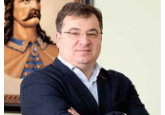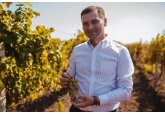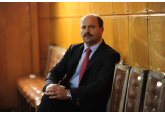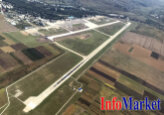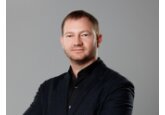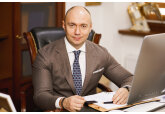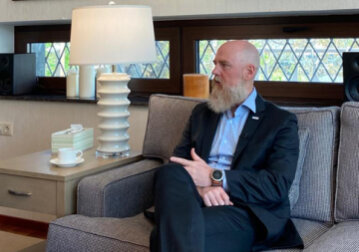
Scott HOCKLANDER: For me, the persistence of Moldovan citizens is not only a learned lesson, but also a great example.
Interview by InfoMarket
USAID Moldova Mission Director Scott HOCLANDER completes his four-year mandate this week. His tenure has included the 30th anniversary of USAID Moldova, the Covid-19 pandemic, the post-pandemic period, the energy crisis, and the war in Ukraine.
In 30 years of activity USAID Moldova has implemented over 130 projects for a total amount of nearly $1 billion and currently implements 10 economic development projects in agriculture, rural development, structural reforms, energy, finance, etc.
Current USAID Moldova economic development projects
|
Project Name |
Implementer |
Project Period |
Projected Budget |
|
Future Technology Activity (FTA) |
Chemonics International, Inc. |
06/2021-06/2026 |
$52.82 mln |
|
Moldova Institutional and Structural Reforms Activity (MISRA) |
Nathan Associates, Inc. |
04/29/2022 - 04/28/2027 |
$35 mln |
|
Rural Competitiveness and Resilience Activity (RCRA) |
Chemonics International, Inc. |
09/2022-09/2027 |
$49.7 mln |
|
Development Finance Corporation (DFC) |
Prime Capital and maib |
01/2019-09/2029 |
$29.11 mln |
|
Moldova Energy Security Activity (MESA) |
Tetra Tech ES, Inc. |
03/04/2022 - 03/03/2026 |
$59.78 mln |
|
Financial Sector Transparency Activity (FSTA) |
International Development Group (IDG) |
09/2019-05/2023 |
$8.12 mln |
|
USAID INVEST |
Development Alternatives Incorporated (DAI Global) |
12/2020 - 09/2024 |
$3 mln |
|
Supporting Entrepreneurship Education in Europe and Eurasia (Georgia, Serbia, Moldova, and Macedonia) |
Junior Achievement Moldova |
01/2017-01/2026 |
$1.2 mln |
|
Regional Farmer-to-Farmer Program |
Cultivating New Frontiers in Agriculture (CNFA) |
10/2018-09/2023 |
$1 mln |
In this interview with InfoMarket, Scott HOCKLANDER talks about USAID accomplishments in 30 years of activity in Moldova as a whole and in particular over the past four years.
Scott HOCKLANDER: I have been in Moldova only four years. It's quite a short period in the context of 30 years of Mission activity, but it was a good time. And the anniversary of the Mission was an occasion to evaluate the progress made during these years: we saw that the assistance which we approved and implemented is directly related to the development path Moldova is on.
In the 2000s, USAID support has focused on competitiveness, particularly in agriculture. Moldova has a huge potential to capitalize on land and increase the added value of agricultural products.
And in the last years we have been particularly focused on developing relationships with ministries, supporting the Government, helping improve legislation to develop the country and managing the processes in the context of strengthening democracy in your country.
InfoMarket: Donors and international partners invest much in Moldova to support its democratization, increase competitiveness on global markets, develop promising sectors such as IT, winemaking, textile industry, finance small and medium enterprises... Why in three decades with such external support does Moldova remain one of the poorest countries in Europe?
Scott HOCKLANDER: I think for the past 30 years Moldova has had, unfortunately, years of missed opportunities. President Maia Sandu, while speaking about the energy crisis, just mentioned that Moldova should have diversified energy sources many years ago, should have controlled the system without waiting for a crisis. And besides the energy sector, there are many areas whose development was not as intensive as we would like it to be. Development is hampered by corruption. Besides, the country faced a theft of $1 billion from the banking system, which caused it to stagnate.
Looking back, and taking into account the tragedy in the neighboring country, Moldova, though it is in a very difficult situation, also has great opportunities. During the last year many people all over the world learned about your country, many high-ranking officials visited Chisinau, which is a phenomenon for Moldova. They express solidarity with you and they understand the challenges the country faces and they support you. They believe in people and believe in Moldova's future. The current government is implementing reforms and is very interested in fighting corruption. I'd like to mention especially the recent years, when with USAID support, the IT sector, agriculture, light industry have developed here, support and training of young people have increased. Progress in many sectors has come exactly in recent years.
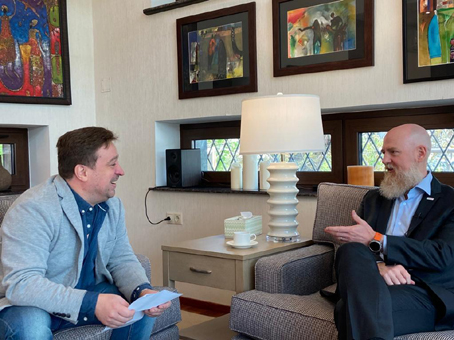
InfoMarket: In the 2005 -2021 period, USAID was actively involved in developing the wine industry, but later on targeted assistance to the wine industry ended and had to be transformed into a new project. How is it currently being implemented?
Scott HOCKLANDER: The development of the wine sector in Moldova is a success story and I'm glad USAID has been supporting it. Yes, direct projects for the wine sector have been completed, but in 2022 we launched the $50 million Rural Competitiveness and Resilience Activity (RCRA) project. Part of the portfolio is for rural development, agricultural support, tourism, local producers and a significant portion is focused on the wine sector. We see that the sector continues to grow and show success, the wines win medals at international competitions.... But there is still a need to consolidate opportunities, to identify new markets. The success of the industry is based on the involvement of all the relevant players, and investment under a single brand. Yes, it's not easy, everyone has different goals, but people have to be together and unite under one brand.
The industry has already had a taste of success, but it still needs time to develop and consolidate. In this regard, recently we have focused on supporting innovation; you can't do the same thing every year as consumers are waiting for innovation. I consider the work of the National Office of Wine and Vine and the consolidation of the capabilities of the entire industry a great success. The sector is developing, although there are new challenges, which, for example, concern the logistics of supplying wines to new markets, especially in the context of the war in Ukraine, because of which we lost access to the port of Odessa.
Going back to the RCRA project, I would like to note that this is a new version of the former project to enhance competitiveness, but as a component it includes the development of domestic tourism, including wine tourism. It is very important for us to support the development of the country outside the capital city where rural tourism is usually directly linked to wine production.
InfoMarket: USAID actively supports the development of the light industry in Moldova. What was its peculiarity?
Scott HOCKLANDER: One direction was to support traditional culture: carpets, folk art; another was to offer modern products to foreign markets. From the outset, we helped the industry in adding value to its products, in creating a reliable environment for workers, in identifying markets, and in giving birth to local brands. The next step was the promotion of local brands and their recognition not only in Moldova, but also in the internationally acknowledged fashion markets. I am not very familiar with the world of fashion, but my wife likes things made in Moldova very much, their design and quality is appreciated in my circle. I consider the results achieved to be impressive.
And now we are focused on the process of increasing the energy efficiency of light industry, its transformation into a green industry. This can be part of the brand - to offer the consumer those products that, in addition to design and quality, are produced with minimal negative impact on the environment. People are thinking more and more about the environment. This direction, along with the support of local companies, young talents and increasing the use of local potential, is part of our support, and we intend to continue it.
InfoMarket: IT was one of the priorities that USAID supports in Moldova. Is it still one of them?
Scott HOCKLANDER: I was recently at an event at IT-Park and saw how much the IT sector in Moldova has grown in recent years. To understand how we support this sector, just look at the projects that we have implemented that have become profitable. We see many competitive and successful startups. Yes, customers all over the world are looking for stability, consistency and sustainability of their contractors. And to further increase the competitiveness of the Moldovan IT sector, it is necessary to ensure appropriate training, not necessarily at the university level. To this end, with our support, centers of excellence were created: Artcor, Mediacor, Tekwill - these are very good examples of hubs offering educational robotics programs for young people, application development, and so on. The industry is growing rapidly and innovative grants are available here for small and medium-sized companies to promote their goods and services online. There are already many professionals providing these services to small and medium-sized businesses. We are encouraging these processes for sustainability in the future.
In this context, I want to make special mention of Nortek, the Center for Innovation and Technology Transfer, which opened last December. It was created in partnership with the Alecu Russo University of Balti. This is very important for us since it demonstrates the need to go beyond the perimeter of Chisinau, as in Balti, for example, there is a huge potential for regional partnership.
InfoMarket: You touched upon the problem of education not only in IT, but also in the field of professions of the future. Last year, a corresponding program was launched, and, as far as we know, the competition among those who wished to become program beneficiaries was many times greater than the offer.
Scott HOCKLANDER: When talking about the "professions of the future," one cannot ignore the demographic situation: many people are leaving their country, and this is happening throughout the region. It's a challenge for the country when young people go overseas after getting an education, as these are the ones who won't work for the local market. Therefore, when determining future professions, such as game design (video game development), animation or multimedia, we proceeded from the fact that they allow young people to be physically in the country, work remotely for other markets and earn good money. There are a lot of talented people in Moldova and there is a lot of potential. Those who learn the professions of the future will be willing to partner with Moldovan companies while promoting the idea of empowering young people to work and stay in their country.
With this program, we have established a link between universities and training centers that are open to collaboration. And, indeed, there has been a lot of interest on behalf of young people. We have created an example that Moldova should invest more in this area, an example proving that this is not only possible, but also in demand.
InfoMarket: And yet, many young professionals who have already graduated leave the country.
Scott HOCKLANDER: Those who graduate from this training have the option to stay in or leave the country. That is their free choice. But I also see young people who leave for a while, come home with some money and new experiences. They open businesses and start families, and in doing so they form a trusting environment for those who will follow in their footsteps.
It is clear that we cannot stop the flow of those who want to leave, but we can create opportunities for them to work at home. The experience of innovative courses should be adopted and expanded by educational institutions to improve their curricula. In this context, it is very important to create bridges between universities and the private sector, which will then need such specialists. Migration is an ongoing process. The right approach would be to focus on creating and providing opportunities. When you create a successful business, there are a lot of people who would like to work with you.
Many Europeans are interested in coming to Moldova since your country is very attractive and developing. Foreigners like the people here, the nature, the food, the wine ... Just 10 years ago, there were very few agro-residences and even in the Old Orhei it was difficult to find a free place to relax. And now there are dozens of new tourist places. Even the guest house in the northernmost point of Moldova, the village of Naslavcea, is actively developing and is in demand, despite the fact that it is far from Chisinau.
We support such projects since there are so many fascinating places in Moldova. In addition, there are new services, such as hiking and biking tours, tasting tours and so on. There are more and more opportunities for travelers and the potential for development in this sector is far from exhausted. And, in addition, there are now many opportunities in different sectors that can retain young people.
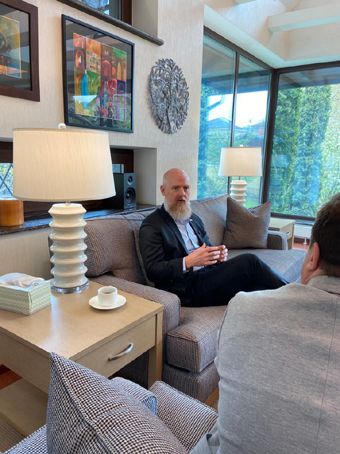
InfoMarket: USAID has worked with different presidents and governments over 30 years. Who has been harder to work with and who has been easier to find common ground with?
Scott HOCKLANDER: We've always been open to working with governments, especially in the area of reform. I think the current Cabinet is one of the most open to reform. There are challenges, but you have to be politically open and change is felt. In Moldova, we work with a variety of partners: the private sector, representatives of civil society, the Government, municipalities at the local level. The nature of these relationships varies depending on who makes the decisions.
We can see how open people are to reforms, for example at the municipal level. USAID has long supported local authorities through the Comunitatea Mea program to strengthen democracy in the regions. I like this project, also because we have a very constructive cooperation with the mayors. We see changes and big transformations in different areas: the waste management system is changing, street lighting, energy efficiency is increasing. We are now supporting over a hundred communities, and there are a lot of active mayors. In partnership with international development programs in Sweden and the UK we are implementing good projects, but a lot of credit goes to local authorities and citizens in the regions.
InfoMarket: How do you assess the cooperation with your colleagues from other countries with whom you have many joint programs?
Scott HOCKLANDER: Our partnership is very constructive. Working together with colleagues from Great Britain, Germany, Switzerland, and Sweden is much more effective. The Moldovan Government is also an active participant in such projects. Each international development agency has its priorities, but when they are common, we join forces, make joint investments, including with the Government's participation. This kind of cooperation opens up more opportunities, for instance, to support development projects in the countryside, and the results are evident.
InfoMarket: The last four years, just when you were the head of the USAID Mission in Moldova, were not the easiest: the Covid-19 pandemic, the energy crisis, the war in Ukraine. What has been the most difficult?
Scott HOCKLANDER: In the course of my visits to different settlements, I ask what problems do people face. And very often people would answer:”There are problems, of course, but we're not stopping and we're moving on.” I like this optimistic approach, which can be learned from.
It's clear that the pandemic has changed us all. But, at the same time, it has also provided new opportunities, accelerated innovation, made it possible to look at everything from a different angle and take advantage of the situation. E-commerce has reached a new level; the development of websites has become a priority even for those who didn't pay attention to them before. This is an innovation that was born out of the pandemic.
The new challenges of the war in Ukraine have also greatly affected Moldova. And yet, when people are faced with crises like this, they become creative and innovative, looking for new ways. Challenges in general make a country stronger. When it faces challenges, it looks for solutions, and often this leads to a win-win: to seize new opportunities through facing the crisis. And here I mean Moldova.
It is clear that the lack of stability is still a big risk, but if the country manages to purge itself of corruption, if it manages to strengthen the democratic processes, I don't see big obstacles for an intensive development. For me, the persistence of Moldovan citizens is not only a learned lesson, but also a great example.
InfoMarket: Over the past year, we have faced an unprecedented energy crisis. That is, for 32 years of independence, almost nothing has changed in the field of energy security. Now we are ready to pay a higher price, as long as there is no shortage of energy resources. What do you think the previous governments did not do? What decisions have not been made before to avoid a similar situation? And are you planning new projects to increase Moldova's energy security?
Scott HOCKLANDER: You are right. The U.S. government recently allocated $300 million to the energy sector, not including the tens of millions that are invested in energy security projects. This sector needs big investments, but I think the way Moldova is passing the energy crisis, by the projects that have already been implemented, is a success story! And yet, two years ago, the country was completely dependent on Russian gas, and the electricity sector - on Ukraine and the MGRES, and no connections with Europe.
Looking back at the past 30 years, we understand why we ended up where we are today. Now it is important to focus on the current situation and to realize new opportunities. When I came to Moldova four years ago, I noticed how energy insecure the country was. At that time, we thought that connecting the country to another energy system was a very long process. But as a result of the crisis, we have identified solutions that reduce energy dependence, diversify sources.
And it is very important to invest in renewable energy sources, to increase the capacity of suppliers. It's a complicated process that requires big investments and changes in legislation. There are quite a few international players willing to invest in these projects for the long term. And on behalf of Moldova, openness is the first step. The country has the ability to borrow for a long time to make investments in its energy security. Yes, these are huge investments, but at least I see that the process has started, especially if you compare it with the situation 3-4 years ago. The situation today has greatly changed for the better.
Yes, it's a big challenge for the citizens of Moldova. But the Government must explain the benefits that these investment projects bring for the citizens. People must understand and have the full right to know exactly what the state is doing, why large and long-term investments are needed. Energy dependence is the main problem of the country; long-term investments can protect it and increase energy security. And there are many opportunities here.
InfoMarket: Are you planning to "open up" new industries for your projects that USAID has not previously been involved in?
Scott HOCKLANDER: There are a number of projects underway, some of which will end in 2027 and even 2029. Some projects, like Comunitatea Mea, will be completed in the next two years. But we are already working on new conceptual ideas to continue to support projects in progress.
Earlier, when we identified the sectors we wanted to support, we looked at the potential and their development in the future. I have to say that some of these have been implemented at just the right time. And I am pleased to know that the success of these projects was due to the cooperation of the Government. The country got a boost in the development process to provide for future generations.
A separate area that attracts our attention, and this applies not only to Moldova, is cyber security. The world is becoming more digital as many activities have gone online. So, security aspects have to be taken into account as well. Along with the Moldovan Government, we are already working on the scenario of strengthening it.
And speaking about the "professions of the future", jointly with the Technical University we are working on the creation of Cyber Academy, which will focus on cyber security. I see great potential in Moldova in this area and there are people interested in it. We have to understand that we can't bring experts from abroad to strengthen the cyber security of Moldova; such specialists should be trained domestically, at the national level, and that's where we can do a lot together.
InfoMarket: There is an opinion that most of the allocated funds stay in the accounts of foreign companies and foreign experts, not more than half of the budgets remain for the projects themselves. How justified is this opinion?
Scott HOCKLANDER: I understand why people ask these questions. It's just that some of our work is clearly visible, such as what we do with the mayoralties. And the other part that deals with the expert work - de-regulatory consulting, process analysis, and so on - is not visible, but it costs money, too. In this context, it is important that we are transparent and communicate better about what we do. People need to understand these processes, get answers from the authorities, which, in turn, must demonstrate the results of their activity.
InfoMarket: USAID has been with Moldova for 30 years, how do you see this cooperation in 30 years?
Scott HOCKLANDER: I think in 30 years Moldova will be a member of the European Union and we support that path of development. I see that your country is developing and has more opportunities. The day will come when Moldova and the U.S. government will implement joint assistance projects helping other countries. Moldova has already learned a lot of lessons, for instance, in the wine industry, in the IT sector. The country is getting closer to the European Union and what USAID is doing in Moldova and is also planning to do are good development directions for the country.
I think in my career as Head of Mission in Moldova, USAID has the richest portfolio of projects that are close to my heart. We are implementing investment programs, and I see their progress, which is reflected in the fact that they are generating new projects. So things are developing exponentially. // 16.05.2023 - InfoMarket.


